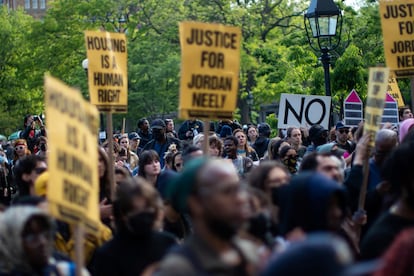Daniel Penny pleads not guilty to revised charges in chokehold death of Jordan Neely on NYC subway
The chokehold death, which was caught on bystander video, has prompted fierce debate, with some praising Penny as a good Samaritan and others accusing him of racist vigilantism

A U.S. Marine veteran who placed a homeless man in a fatal chokehold aboard a New York City subway train last month pleaded not guilty on Wednesday to revised charges. Daniel Penny, 24, pleaded not guilty to second-degree manslaughter and criminally negligent homicide in the May 1 death of Jordan Neely, a former Michael Jackson impersonator who was shouting and begging for money on the Manhattan train, according to witnesses.
Penny pinned him to the ground with the help of two other passengers and held him in a chokehold for more than three minutes. Neely, 30, lost consciousness during the struggle. The chokehold death, which was caught on bystander video, has prompted fierce debate, with some praising Penny as a good Samaritan and others accusing him of racist vigilantism. Penny is white and Neely was Black.
At a brief arraignment on Wednesday, Penny, who is free on bond, uttered only the words “not guilty” before leaving the courtroom with his lawyers.
Penny was initially arrested on the manslaughter charge in May, but a grand jury earlier this month added the negligent homicide count, potentially giving a trial jury the option of finding him guilty of the lesser charge.
To get a manslaughter conviction, which carries a prison sentence of up to 15 years, prosecutors would have to prove Penny recklessly caused Neely’s death while being aware of the risk of serious harm.
A conviction for criminally negligent homicide would require the jury to find that Penny unjustifiably put Neely at risk of death, but failed to perceive that risk. The maximum penalty would be four years in prison.
Penny, who served in the Marines for four years and was discharged in 2021, has said he acted to protect himself and others from Neely, who allegedly shouted “I’m gonna kill you” and said he was “ready to die” or go to jail for life.
Following the arraignment, an attorney for Penny, Steven Raiser, predicted that a Manhattan jury would empathize with the experience of confronting erratic subway behavior while “confined underground.”
“Danny isn’t the only one on trial,” he said. “The rights of people to defend one another will be on a trial too.”
Neely’s family members and their supporters have said Neely, who struggled with mental illness and homelessness, was crying out for help and was met with violence.
Neely’s father, Andre Zachery, was in attendance for the arraignment on Wednesday. At a brief press conference, an attorney for the Neely family, Donte Mills, sought to paint Penny as a vigilante killer who hasn’t taken responsibility for his actions.
“Daniel Penny did not have the courage to look Jordan’s father Andre in the eyes,” Mills said. “But from now on, don’t be shocked when justice happens for Jordan, for you or for anyone.”
Neely’s death aboard an F train in Manhattan quickly became a flashpoint in the nation’s debates over racial justice and crime. Republican politicians like Florida Gov. Ron DeSantis have hailed Penny as a hero, helping him to raise more than $3 million in legal expenses.
Meanwhile, civil rights leaders, including Rev. Al Sharpton, have compared the killing to the 1984 subway shooting of four Black men by Bernhard Goetz, a white man dubbed the “subway vigilante” who was eventually acquitted of charges in the shooting except for carrying an unlicensed gun.
“A good Samaritan helps those in trouble. They don’t choke him out,” Sharpton said during Neely’s May 19th funeral. “What happened to Jordan was a crime, and this family shouldn’t have to stand by themselves.”
Sign up for our weekly newsletter to get more English-language news coverage from EL PAÍS USA Edition
Tu suscripción se está usando en otro dispositivo
¿Quieres añadir otro usuario a tu suscripción?
Si continúas leyendo en este dispositivo, no se podrá leer en el otro.
FlechaTu suscripción se está usando en otro dispositivo y solo puedes acceder a EL PAÍS desde un dispositivo a la vez.
Si quieres compartir tu cuenta, cambia tu suscripción a la modalidad Premium, así podrás añadir otro usuario. Cada uno accederá con su propia cuenta de email, lo que os permitirá personalizar vuestra experiencia en EL PAÍS.
¿Tienes una suscripción de empresa? Accede aquí para contratar más cuentas.
En el caso de no saber quién está usando tu cuenta, te recomendamos cambiar tu contraseña aquí.
Si decides continuar compartiendo tu cuenta, este mensaje se mostrará en tu dispositivo y en el de la otra persona que está usando tu cuenta de forma indefinida, afectando a tu experiencia de lectura. Puedes consultar aquí los términos y condiciones de la suscripción digital.








































